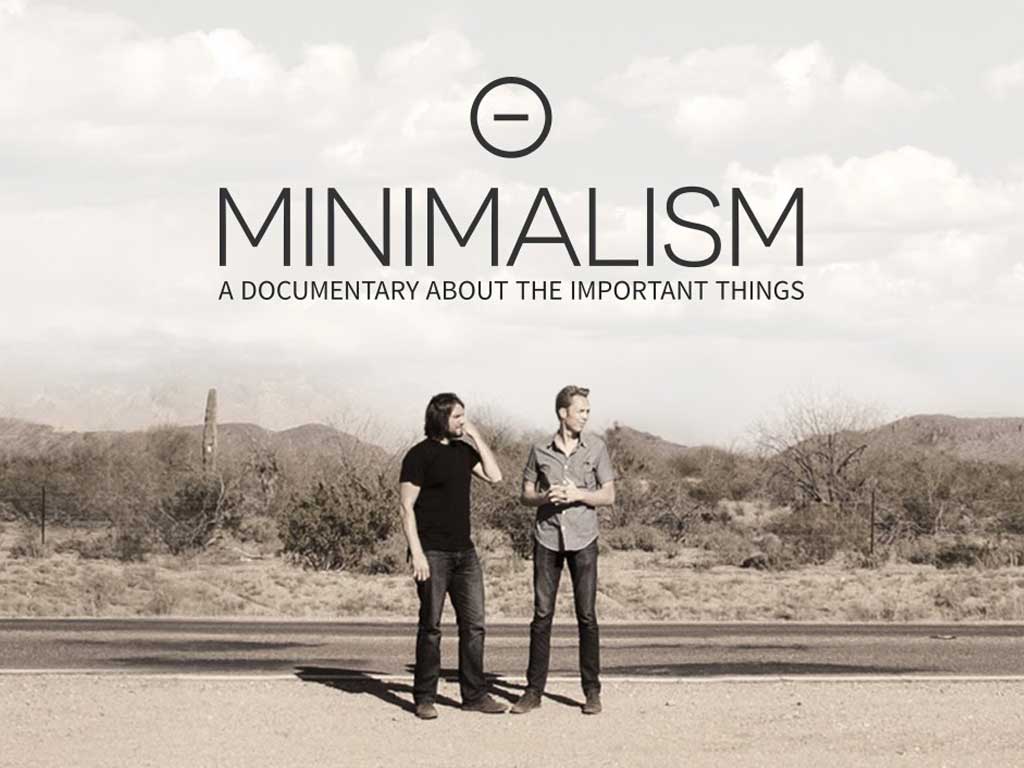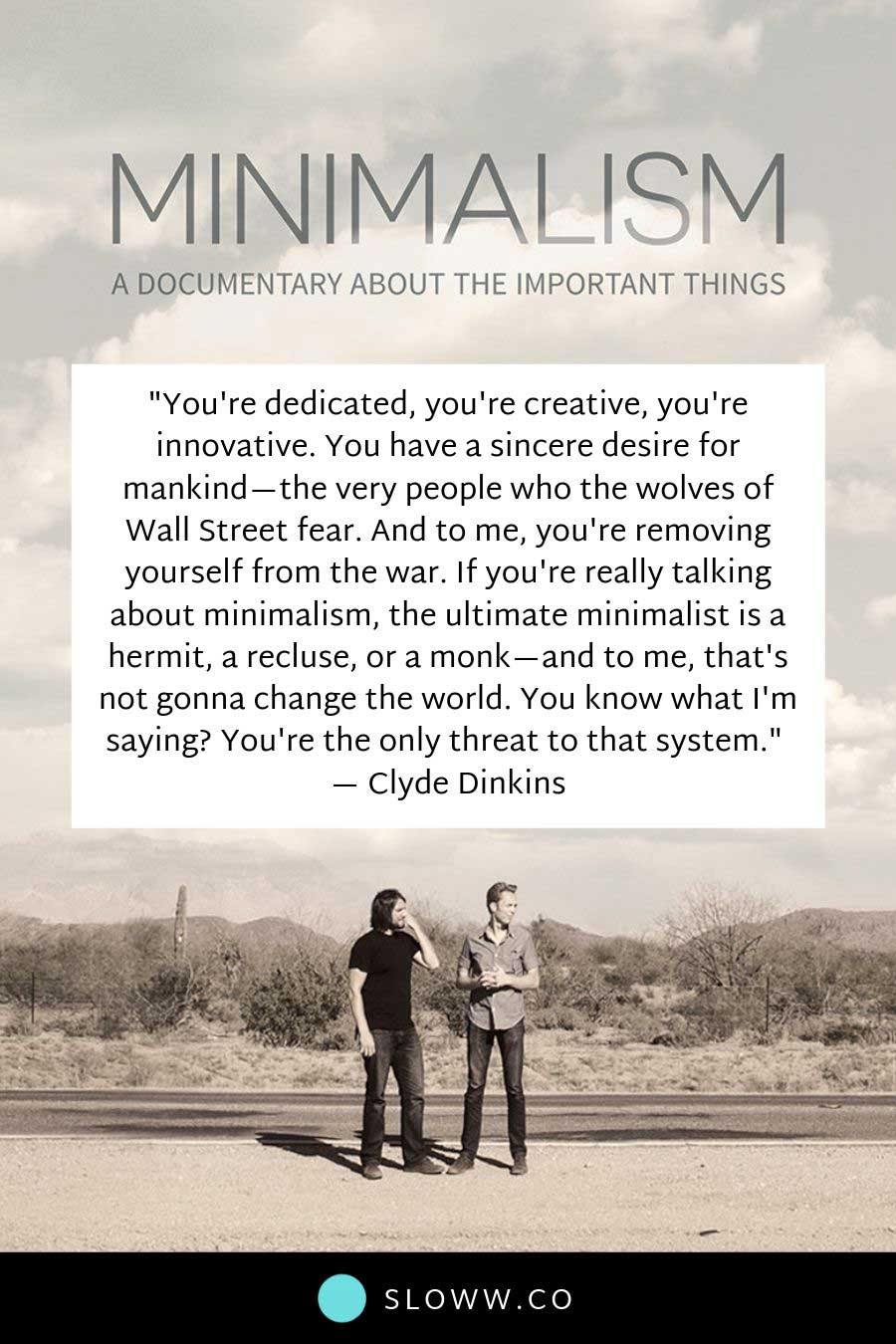
The One Quote Burning in my Brain from the Minimalism Documentary

There was one part of the film in particular that stuck with me even though I only watched it once. I’ve wanted to write this post for years, but I could never find the exact quote anywhere online. This week, I finally revisited the film to find it.
What’s the one quote that’s been burning in my brain?
Clyde Dinkins, a Las Vegas resident, challenges Joshua Fields Millburn & Ryan Nicodemus (aka “The Minimalists”) during a Q&A session at the end of one of their events:
You’re dedicated, you’re creative, you’re innovative. You have a sincere desire for mankind—the very people who the wolves of Wall Street fear. And to me, you’re removing yourself from the war. If you’re really talking about minimalism, the ultimate minimalist is a hermit, a recluse, or a monk—and to me, that’s not gonna change the world. You know what I’m saying? You’re the only threat to that system…We’re trying to destroy those wolves of Wall Street. I’m serious. — Clyde Dinkins
This hit me hard a few years ago.
It was my exact thinking at a time when I was struggling to reconcile my work (marketer—selling people more stuff) with my life (downshifting, voluntary simplicity, minimalism—all in the spirit of less).

3 Ways to Break Down this Quote from the Minimalism Documentary
In order to really discuss this quote, it’s helpful to break it down into three parts:
Let’s start with the easiest part of the three. While Clyde is right that “the ultimate minimalist is a hermit, a recluse, or a monk,” he’s only considering one very extreme end where a person removes themselves from society to be an ascetic or luddite living in a cave alone somewhere.
That’s not the goal of Joshua, Ryan, or virtually any other minimalist today. Here’s minimalism in their words:
- “Minimalism is a tool to rid yourself of life’s excess in favor of focusing on what’s important—so you can find happiness, fulfillment, and freedom…Minimalists don’t focus on having less, less, less. We focus on making room for more: more time, more passion, more creativity, more experiences, more contribution, more contentment, more freedom. Clearing the clutter from life’s path helps make that room. Minimalism is the thing that gets us past the things so we can make room for life’s important things—which aren’t things at all.” — Joshua Fields Millburn & Ryan Nicodemus, The Minimalists
- “Minimalism is the intentional promotion of the things we most value and the removal of anything that distracts us from it. It requires a conscious decision because it is a countercultural lifestyle that stands against the culture of overconsumption.” — Joshua Becker, author of Simplify
- “My definition of a minimalist is a person who knows what is truly essential for him or herself, who reduces the number of possessions that they have for the sake of things that are really important to them.” — Fumio Sasaki, author of Goodbye, Things
- “Minimalism is not a lack of something. It’s simply the perfect amount of something.” — Nicholas Burroughs
- “My ethos is ‘Life-Enhancing Minimalism’—it’s about having and loving everything that you need but nothing more than what you need.” — Clodagh
The first big question: Did Joshua and Ryan—by quitting their careers to live and preach minimalism—remove themselves from “the war” as Clyde described it?
Would quitting my marketing job be removing myself from “the war”?
Is there even a war? If so, is this the war of our generation? The war to take back control of our selves and our own lives?
These were all the questions spinning around in my mind when I first watched the film. It’s probably a good thing I’ve had a few years to reflect on the answers. Here’s what I believe now.
Joshua and Ryan may be minimalists, but as much as (or more than) that, they are entrepreneurs. Their website currently says they’ve helped over “20 million people live meaningful lives with less.” If there is a war, they’ve obviously had a much bigger impact on it doing what they’re doing now instead of their previous corporate jobs.
Clyde seems to be most concerned with what will “change the world.” And, he believes the “dedicated,” “creative,” and “innovative” with a “sincere desire for mankind” are the best people for the job of changing the world.
This is probably the area where having a few years to reflect has helped shape my perspective the most.
It’s not about changing the world; it’s about changing ourselves. Only through changing ourselves will we change the world.
- “Everybody thinks of changing humanity, and nobody thinks of changing himself.” ― Leo Tolstoy
- “Yesterday I was clever, so I wanted to change the world. Today I am wise, so I am changing myself.” ― Rumi
- “The world as we have created it is a process of our thinking. It cannot be changed without changing our thinking.” ― Albert Einstein
- “The character of a society is the cumulative result of the countless small actions taken day in and day out, by millions of persons. Small changes that may seem unimportant in isolation are of transformative significance when adopted by an entire society.” — Duane Elgin
A Quick Preview of the Minimalism Documentary
If you haven’t watched the film yet, here’s the official trailer:
In typical minimalist fashion, here’s what The Minimalists themselves say about the film:
- “How might your life be better with less? This film examines the many flavors of minimalism by taking the audience inside the lives of minimalists from all walks of life.”¹
The documentary is a good intro to minimalism if you are new to the concept.
What are your thoughts on this one challenging quote? Please let me know in the comments.
Footnotes:
- https://www.theminimalists.com/films/




